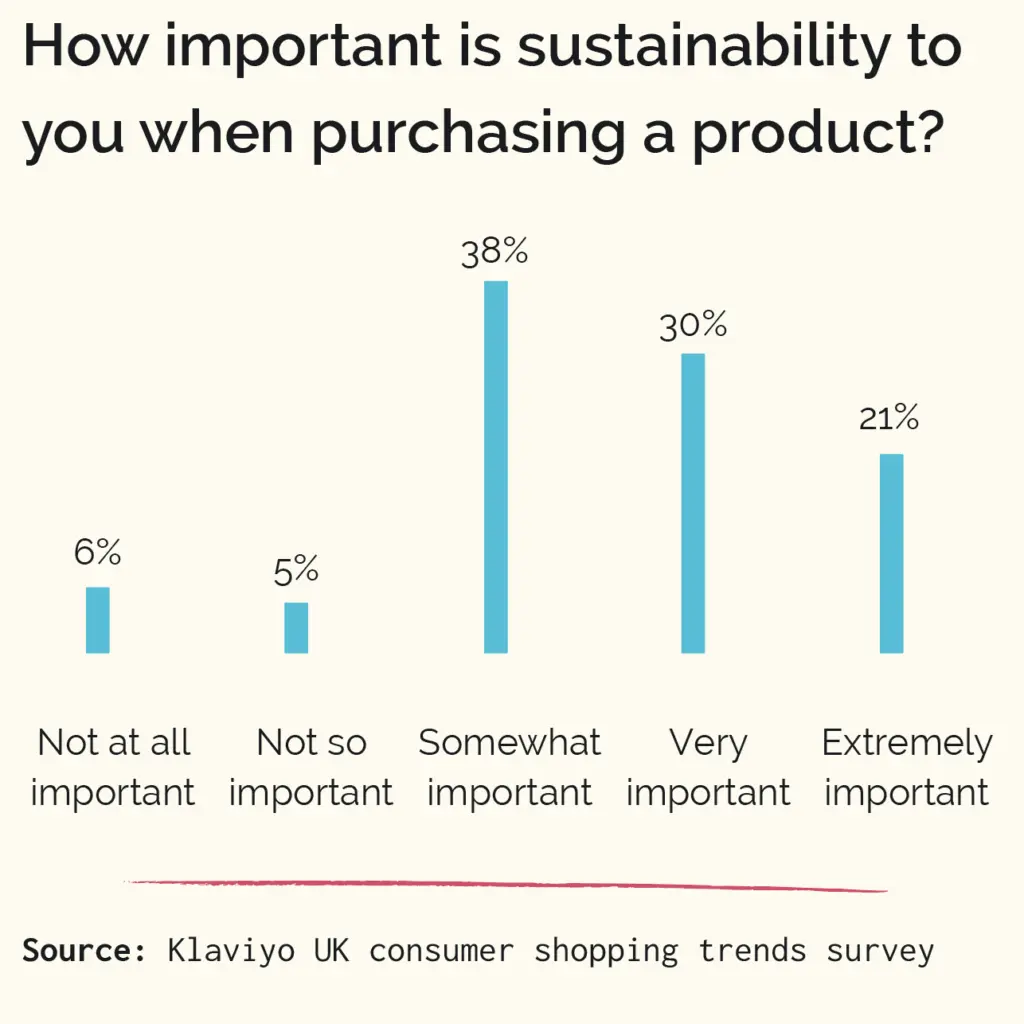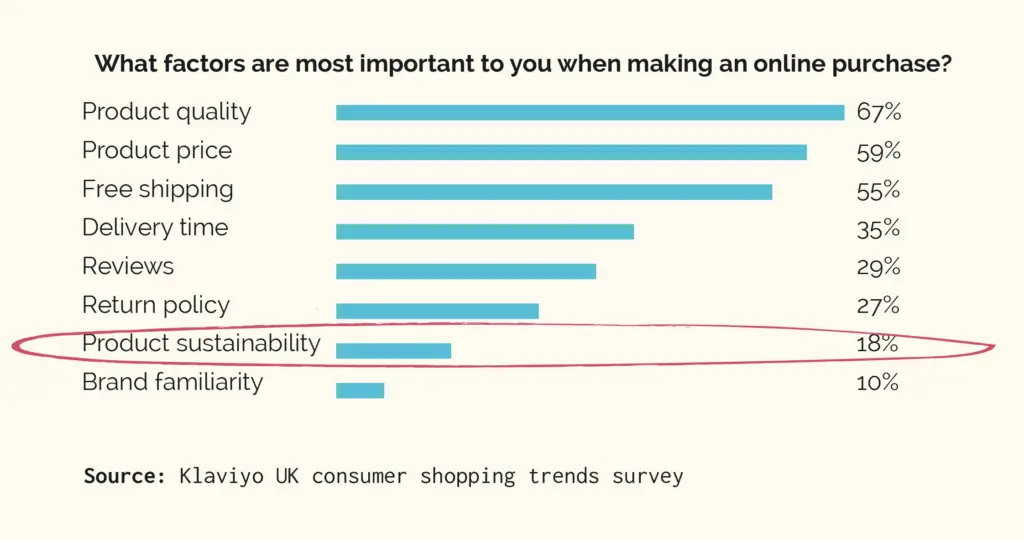Consumers say they care about sustainability—their wallets say otherwise
We all like to think that sustainability is a crucial consideration when consumers buy—and, by extension, brands must invest in going green.
Except, it turns out that your customers don’t actually care. Or, more accurately: People say they care, but don’t spend money on the eco-friendly goods they say are important.
In our recent UK consumer survey, we learned that there are two ways for a business to succeed with a sustainable initiative:
- Keep your prices competitive, or
- Prove beyond a shadow of a doubt that your business is actually sustainable.
Consumers say they want sustainable goods—but don’t actually buy them
People overwhelmingly say that sustainability is important to them. In fact, 89% said that sustainability was at least somewhat important to them when purchasing a new product, and over 50% say it’s very or extremely important.
Over 50% of those surveyed say sustainability is very or extremely important.

Based on that figure, if all UK consumers shopped based on their values, nearly 9 in 10 consumers would buy sustainable products.
In practice, less than one-third of people are actually putting their money where their values are. Only 27% of people usually or always opted for a sustainable product in the last six months—which means there’s a huge gap in how people feel versus how they act.
Only 27% of people usually or always opted for a sustainable product in the last six months.

- *As qualified by respondents saying sustainability was somewhat, very, or extremely important to them.
- **As qualified by respondents reporting they always or usually opted for sustainable products in the last 6 months.
Consumers don’t want to spend more on sustainable goods
So why don’t consumers put their money where their sustainable values are? Here are the top three reasons people don’t opt for a sustainable product:

The most common reason—that sustainable goods are more expensive—probably doesn’t surprise you. The second two might not surprise you either, but they may point to a much bigger problem for sustainability: Brands can’t put the onus of shopping sustainably on their customers.
Retail brands that want to reduce their carbon footprint shouldn’t rely on customers to put in the time and effort to verify whether a product that they’re considering purchasing is actually sustainable.
After all, customers are regularly bombarded with greenwashed messages, where a brand will market something that’s “eco-friendly,” while that product may actually cause more harm than good for the planet. This greenwashing in marketing has led consumers to wonder whether the sustainability that they think they’re buying is actually what the brand is selling—a threat to any brand that’s actually trying to practice sustainability.
Sustainability is consumers’ near-last consideration
So, how do brands tap into causes that customers care about—but in a way that doesn’t continue to suffocate our planet?
We asked consumers about a variety of factors that they consider when making an online purchase. And when consumers list their top priorities, sustainability is rarely in the top three.

Does this mean sustainability isn’t important to consumers? No.
89% of consumers say sustainability is important to them—and only a minority say that they’re not interested in sustainability, or if they think it makes a difference.
89% of consumers say sustainability is important to them

What that list of customers’ priorities actually means: Sustainability isn’t as important as the other higher-ranking factors, which is crucial for brands to understand.
At the end of the day, sustainability is a “nice-to-have” for consumers. It might be the deciding factor between two otherwise similar products, and it almost certainly makes someone feel good about their purchase—but it’s rarely a shopper’s top priority.
And that means that if brands prioritize sustainability at the cost of something that consumers value more, people won’t opt for the eco-friendly option. Then, a brand’s sustainability initiative will flop.
And since consumers rank most things above sustainability, there’s a lot of room for failure. Here’s a recap of the six factors that consumers rank higher than sustainability:
- Product quality
- Product price
- Free shipping
- Delivery time
- Ecommerce reviews
- Return policy
Free shipping is important to consumers, so it’s no surprise that brands that sacrifice free shipping for sustainability take a huge gamble—a gamble that will fail more often than not.

But not all six of the most important purchase factors are the same. While free shipping is a binary (it’s either free or not), most of these qualities are more complex, which might give brands a fighting shot in the race to zero carbon emissions.
Our survey data shows consumers might be ready to make concessions on something like product price, their number two priority—if they’re given a good reason.
To succeed, keep prices competitive and be more believably sustainable
So what does this mean for brands that recognize the importance of reducing their impact on the planet? (And, if 89% of your customers believe it’s important, hopefully you see value in that alone.)
Let’s review the top three reasons people don’t purchase a sustainable product:
- It’s more expensive (53%)
- It requires more time/effort (42%)
- Not sure if the product is truly sustainable (42%)
The cost of a product is the number one concern for consumers. But knowing whether or not a product is sustainable also makes the top three.
This directly translates to how customers want businesses to approach sustainability. While 49% of consumers say they would be convinced to go green if they don’t have to shell out extra cash, an almost equal 47% prefer believable proof that their purchase is making a difference.

The data says there are two things you can do to help your customers support sustainability: Be cautious in increasing the cost of your product and offer better proof that your brand isn’t greenwashing.




